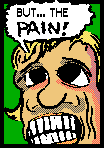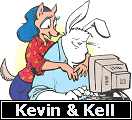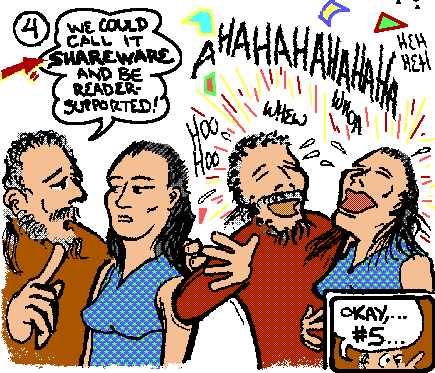Creativity and the Web
Pondering art in the digital age

I've been pondering the two posts, on Ace of Spades, by Monty last month, the one about the business of self-publishing online ("All I want for Christmas is DOOM") and the earlier book-thread-on-Thursday one about content vs. format ("The Book Fetish"). The reader may want to go read those, before, or even rather than, this.
And pondering how digital media has changed everything, noting the passing of not just bookstores but places like PhotoMat and Blockbusters, even most LP/CD "record" stores.
Relatedly, pondering the question sometimes discussed on the book thread about why we create, writing for money vs. writing because we must or are inspired to do so. Thinking about Solzhenitsyn (I think it was) discussing "writing for the bottom drawer" when there is no actual market.
Thinking about how a creator may be able to create, but the creator who is able to self-edit and self-market is as rare as the self-representing in court or self-prescribing in medicine who doesn't "have a fool" for a lawyer / doctor. That's me.
Would I like to make money, even a living, off my creativity? Well, sure, but I'm just a schlub.

As a wannabe mightabeen cartoonist, I've been thinking about all this in comparing comic strips.
There's Garfield, the dull and repetitive and interminable marketing wonder, with worldwide distribution of the strip, TV series, movies, suction-cup car window dolls, and all manner of merch.
And there's the highly acclaimed, very artistic, totally-un-merchandized, and ultimately self-terminated Calvin and Hobbes.
Somewhere in between creatively, there's Kevin & Kell, the longest-runnning online comic strip, which has managed to survive for twenty years now. I recently marathon-read the entire strip from the beginning. I first ran into this clever and stays-fresh series on CompuServe. Good for the creator, keeping it going, making a living of sorts from it eventually. It's been an inspiration for my own online work. Creatively in the online medium, if not commercially.
In high school back in the late 1960s, I was encouraged by an English teacher to submit a lame story to a major magazine. (SF alt-history: Booth missed.) That major magazine's imprint was the first of several prestigious rejection slips from publishers and syndicates I collected before I quit trying. Girls, graduation, and thinking I really wasn't very marketable got in the way. "Write what you know," they told me. I didn't think I knew anything. No experience, no craft, no skills. Shrug.
Other than that teacher, I never had any encouragement to pursue my "art" side in any way. Even my flirtation with becoming an architect was squelched.
By college, I wasn't sure where I was going. I was supposed to be heading into some kind of career, by way of liberal arts. Meanwhile, I was always doodling and drawing. Just for fun.
During an extended college working break, I started my own true self-education, and it was at that point I first took up writing songs, learning music (still trying to learn), more serious cartooning efforts, and "funny recordings" on the reel-to-reel. Also, animations (live and drawn) and other fun work in super-8 film medium. (Noting I first did live-animated work when young, using Dad's 16mm film camera, alas long lost.)
If you put all that together, you see animated musical cartoons. I have a rudimentary one I've been working on since that early-1970s time….
Back to college, briefly, where I still didn't know where I was going, but did take a "creative writing" course where the professor led the class in mocking my efforts, one of several impeti to dropping out.
I headed for the country, to continue my efforts at becoming a creative type, except: I still didn't really think I was very good at anything in particular, not my writings, comics, songs, animations, or funny recordings.
I mean, I figured I might get better, but I just didn't think I'd ever produce anything popularly marketable. Too eclectic and varied in interest, mainly.
I had ideas about self-syndicating short radio programs to college stations, things like that. Maybe like the stuff you'd hear on Dr Demento. Trying to reach some kind of tiny-niche market.
And I had this wacky idea that eventually there would be a larger market for niche stuff, some kind of computer-based world network... Of course, there were no home computers yet.
I continued writing songs, making recordings for friends. Occasional cartooning with no outlet. Did some early "music videos" of friends (all lost). Dabbled with doing pro video work. Reality kept crushing my attempts at such things.
In the '90s, I was encouraged to self-publish in the mini-comic format by the master of quick-product stick-figure mini-comics, Matt Feazell (creator of Cynicalman). My comics tended to be more elaborate, but 8- and 16-page mini-comics was an encouraging format. I cranked out quite a few issues of various sorts.
Despite the overpriced 25¢ cost, I actually sold some mini-comics, somehow, but I made more on my "free" Urantia-Book-based "UB Comix," receiving several supportive donations of $5 to $20.
None of this was going to be a profitable career path, but it was fun as a hobby to get a little cash encouragement!
Some comic book reviewing (the lowest form of writing - reviewing!) on CompuServe Comics Forum led to a few months' gig reviewing for a comics fan magazine. Actual paid published work. They fired me. Wasn't snarky enough for them. That's okay, I was burned out on reviewing before I started with them.
They still owe me for my last published work!
At the instigation of a friend, I finally made the jump from the warm, secure confines of CompuServe to some big, new, wide-open, wild space called the Web. I opened up my website on March 17, 1996 (although it would be many years before I wised up and got my own actual domain name).
Funny thing was, I first thought of it as a place to market my self-publications, like the mini-comics. I had a catalog page of my comics with ordering information. I created a 3-D comics spinner (if you could run VRML) for displaying them.
It was only after I put up a sample comic, in full color ("It's All in Your Mind"), that it hit me: this was not an advertising medium. The web was the "frame," the medium, for every kind of work I was doing. Writings, music, comics, animations, even virtual realizations. Potential world-wide audience with minimal production costs. I began dumping all my writings, lyrics, and cartoons into the website.
Knowing how easily anything digital could be bootlegged, I made the decision then, twenty years ago, not to try to put anything behind a paywall, but to put it all up for free. I asked for donations by mail, eventually adding PayPal donation buttons. And in twenty years, I have received not one cent from my colossal quantity of web efforts. (Doom indeed, Monty!) Sold a few items, sporadically, in my CafePress store, but no bleedover into the website from that.
Holbrook's quirky Kevin and Kell comic inspired me in a couple of ways. I did a series of "Daily Doodles," starting 1997 Feb 2, which ran for several months, with an interruption of a few weeks for sick leave. Inconsistent quality, rather crude in spots, but with some fun and funny stuff.
The Daily Doodles series was revived fifteen years later, in 2012, and ran for a full year then. Forcing myself to put something up every day did have its advantages. I did some of what I think of as my best art and cartoon work, although it was also while I neglected much "real life" work I should have been doing. That's another balancing act with which I've had trouble.
Another attempt at a daily strip, which ran less than two weeks, was "Mind Fuel", which began as a
comic strip rumination on creating a comic strip for the web, including on how it would be marketed. (Key line: "And the income comes in where, exactly?")
I have always been beset by technical limitations. In the earliest days, I had only a low-res hand-held grayscale scanner and the art programs were crude, and monitors (both mine and the "ordinary viewer's") were limited to CGA. All my original cartoons were 16-gray or 16-color.
Today, I have a bigger crayon box, a big color scanner and a big screen, but I still don't really have what I crave - art-input tablet or serious audio and video production and animation capability. I do what I can, always exceeding my limits, pushing the technical envelope in which I'm stuck.






